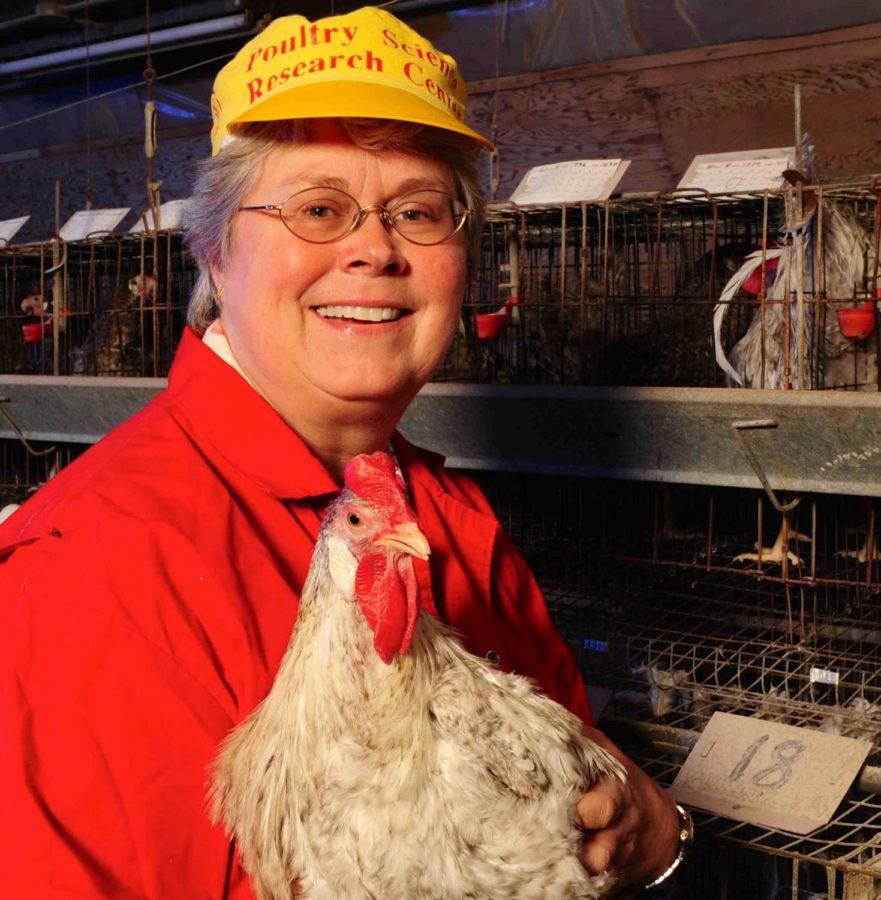Stronger chickens, stronger Africa
Susan Lamont, distinguished professor in agriculture and life sciences, is Iowa State’s lead contributor in a research team aimed towards developing and improving poultry production for developing nations. The U.S. Agency for International Development seeks to employ their research for combatting malnutrition in rural portions of Africa.
November 13, 2013
Two ISU professors are working to create chickens that are more disease-resistant and heat-resistant for people in Africa.
The project is conducted through the U.S. Agency for International Development in its initiative to “Feed the Future,” which researches the science of food security.
Susan Lamont, distinguished professor in animal science and the lead on the project, said that the research will focus on Newcastle disease. Newcastle is a virus that affects chickens all around the world.
“It comes in many different forms, from very mild to extremely virulent,” Lamont said of the virus. “If a flock becomes infected with [the very virulent form], very soon, within a matter of days you could lose a large percentage of the flock.”
Newcastle disease starts out as a respiratory problem, Lamont said. In a very short time, the virus can kill the chicken.
Lamont said that the virus is the biggest problem in chicken production in Africa. While there is a vaccine that is available in the United States, people in Africa are not able to use the vaccine.
“They don’t have the proper refrigeration to store vaccines,” Lamont said.
The research is a collaborative project with the University of California-Davis and the University of Delaware.
At Iowa State, Lamont and her project partner Jack Dekkers, distinguished professor of animal science with an emphasis on poultry, will be experimenting with chickens to find out what genes make a chicken more resistant to Newcastle disease.
To perform the experiment, Lamont said that some of the chickens will be infected with Newcastle disease.
“The vaccines are themselves a live virus. They’re a more mild form of the virus and that can be used in a protective fashion at a low dose,” Lamont said. “But if we use it at a higher level of infectivity, we can actually use the vaccine virus in order to look at the birds’ response to Newcastle disease.”
The infected chickens will be held in biosecure rooms, Lamont said. Every student that interacts with them will have to follow biosecurity measures. While the virus very rarely causes conjunctivitis in humans, it can spread to other chickens very easily.
From this experiment, Dekkers said that the team will be able to look at the genes that are responsible for creating resistance to the virus using statistical models. Once the genes are discovered, the team can then screen chickens for those genes.
“We can screen birds and find ones that have good genes versus bad genes in resistance to the virus,” Dekkers said. “It’s like with cancer genes. You can get a genetic test for the gene.”
Birds from the ISU poultry farm and from Hy-Line, a poultry company in Dallas Center, Iowa, will be used for the experiments.
While the chickens will not be the same breed as those in Africa, they will be similar enough to conduct the experiment.
Another part of the project is determining what gene is responsible for heat resistance. The University of California-Davis will be working on finding that gene.
In January 2014, Dekkers and Lamont will be traveling to Africa to start planning for the next step in the project, which is meeting with the team from the African universities they will be working with and planning training sessions that can be passed on to African farmers.
Lamont said they will be in Tanzania for the first part of the trip and in Ghana for the second part of the trip.
The project is intended to not only develop healthier birds in Africa, but to also help the people in Africa be able to sell and consume the healthier chickens.
“One of the things that makes me feel very strongly about this is that the poultry production really, really contributes to the family nutrition and lifting families out of poverty,” Lamont said. “We are really looking forward to it and we have really comprehensive experts.”
Lamont said the project is planned out over a five-year span in which the goal is to have developed more resistant chickens at the end of the five years. She also credited Max Rothschild, distinguished professor of animal science, for his role in showing the U.S. Agency for International Development that not only plants but animals are needed for development.

















